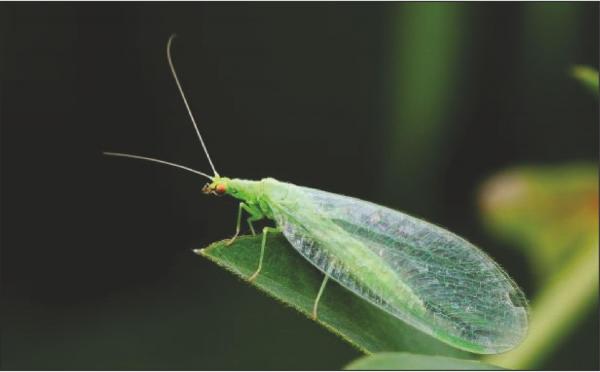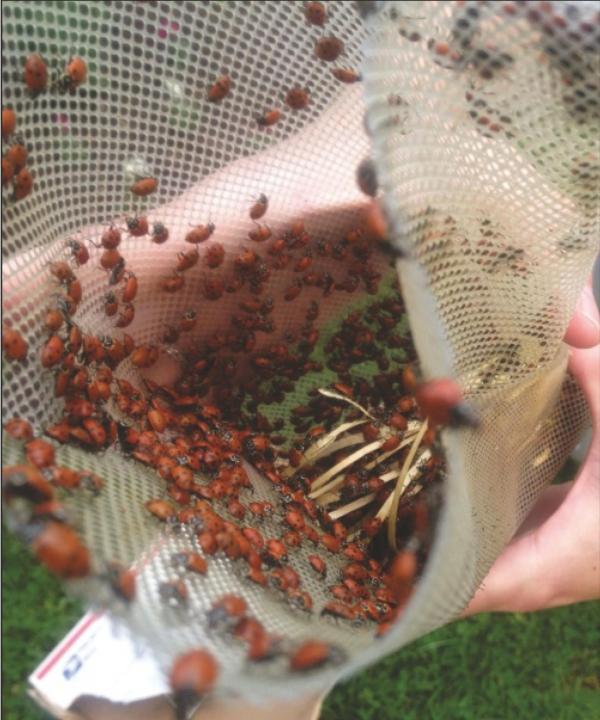Garden Pest Control
I was recently invited to speak at the Wimberley Garden Club’s February meeting. I spoke on the subject of beneficial insects. Although this is not one of the subjects I get to speak about very often, it is one of my favorites. It is surprising how many people do not realize that not all insects are bad pests.
There are some insect species referred to as beneficial insects that can provide a long-term sustainable pest control solution by preying on the bugs that do a great deal of damage to your garden and backyard plants. Beneficial insects are considered a biological control solution, which refers to methods of controlling pests using other living organisms. Perhaps the best thing about taking advantage of beneficial insects is that it allows the homeowner to cut back on or eliminate the use of chemicals on their yards and in their gardens completely.
Pick a pest and you can usually find a natural control for it. Yet each year North American homeowners use approximately 136 million pounds of pesticides on lawns and gardens, and in the home. In fact, homeowners use about three times the amount of pesticides as farmers. Most wildlife pest poisonings, and most surface water contamination from pesticides come from single-family homes. This is a real and growing problem that we need to take steps to correct.
My answer to the problem is to mimic nature as much as possible. You will never find Mother Nature out spraying pesticides, herbicides, fungicides, or any other “cides” you could think of. Mother Nature likes to keep things in balance, using beneficial insects and healthy plants to take care of themselves. We can work in a similar fashion.
The easiest way to prevent insect damage in your garden is to discourage them from coming in the first place. Thinking about this now, at the very beginning of the gardening season is the key to growing a healthy garden. Many studies have shown that a healthy garden is the best defense. Pamper your lawn and garden from the ground up by employing natural composting methods, mulching, and top-dressing your soil with compost or natural fertilizer. Hands down this is the best way to develop strong, vigorous plants that invite beneficial insects to the party while being able to ward off harmful insects themselves.
Take it one step further and as your plants are growing watch for any signs of weak, sickly, struggling plants. If you spot any do not be afraid to pull the plant and dispose of it away from the garden area. Plants like these may already be infected or at the very least will invite harmful insects and disease into your garden. Practice nodig or no-till gardening to minimize soil disturbance which will help minimize the introduction of pests to the soil is a great idea too. Plus, it will actually aid in increasing the beneficial microbes that work to support the plants as they grow. Also, clear your garden area of debris and weeds regularly. These garden messes are nothing more than breeding places for insects. Use clean mulch for the same reason.
Finally, I would suggest you take steps to introduce beneficial insects to your garden areas. You can buy many, such as Praying Mantis eggs and Ladybugs at most local nurseries to start. You can also plant foliage that attracts beneficial insects too.
The plain truth is that there are many great reasons to introduce beneficial insects. You can cut down on chemical pesticide use, which is the first and most obvious benefit to using these insects. The non-toxic approach allows you to grow plants organically. Keep in mind that chemical pesticides don’t only wipe out the bad bugs. They are just as deadly to the beneficial insects. This is bad for the long-term maintenance of your garden as there won’t be a population of natural predators to feed on the pests. Pesticides may be effective at wiping out of the first wave of pests, but then what? A vicious cycle of more and more pesticides? That is not a good answer.
Another plus is the cost savings factor. In the long run beneficial bugs are there to stay if you are able to build an environment for them to thrive in. You might not even have to spend any extra money next year to see a continuing benefit. It may not even cost a penny if the beneficial insects are attracted using native plants.
There is also the resistance factor to consider. A large number of insects are starting to show greater resistance to chemical pesticides. According to the Pesticide Action Network, between 500 and 1,000 insect and weed species have developed strong resistance to many pesticides since 1945. But that will do them little good if they are being eaten by a predator.
Share the wealth too, let your neighbors know what you are up to, if you have the courtesy to educate your neighbors on introducing beneficial insects they may want to join in the fun. The last thing you want is for your neighbors to be spraying chemical pesticide all over the place, which in turn, could easily have a negative effect on your garden. Who knows? Your neighbors may also be willing to share the cost of investing in these beneficial insects too.
A few of my favorite beneficial bugs that can be picked up online or in most garden centers are:
Ladybugs - These common insects consume aphids, mites, whiteflies, and scale. Planting members of the daisy family (Compositae), tansy, or yarrow will attract them to your garden.
Praying Mantis - These large insects have an appetite for most garden pests and are attracted by plantings of cosmos, marigolds, and dills. Praying mantis eggs are set out in the garden where they hatch and quickly grow to adult size.
Lacewings - These are avid consumers of aphids, and their larvae eat aphids and other varieties of other insect pests. They are attracted to “composite” flowers, such as yarrow, goldenrod, black-eyed Susans, and asters.
Nematodes - Nematodes are effective against cutworms, a common pest that destroys sprouts before they can grow into seedlings. Nematodes are also effective against beetles and root weevil larvae. Beneficial Nematodes are very small worms found naturally in our soil and other habitats and they remain effective for about two years. For the average homeowner, or organic gardener, Beneficial Nematodes offer the greatest value when it comes to biological control due to the wide variety of pests they control and the ease of getting great results. Looking like short non-segmented worms these voracious predators make their way through your lawn and garden looking for food. Nematodes do not harm beneficial worms, birds, plants or the environment; in fact, they are part of the environment and are found the world over. Nematode eggs are microscopic and come in a small sponge a million at a time. These are mixed with water and applied to the soil, where they hatch and go to work. If they get on foliage, wash them off to the ground.
Take time to talk to the good folks at local garden centers and find out which beneficial insects work best for your situation and get to work. Remember, biological control methods like using these insects should not be viewed as immediate solutions. In most cases, it may take from a couple of days to a few weeks to see any sort of result. Be patient and make sure you are playing your part by providing a suitable habitat for the beneficial insects to co-exist with your healthy garden. Simply set aside a small garden plot of flowering plants designed to attract and harbor beneficial insects. It is just that easy!




